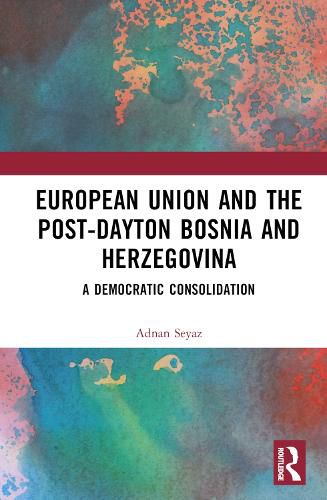Readings Newsletter
Become a Readings Member to make your shopping experience even easier.
Sign in or sign up for free!
You’re not far away from qualifying for FREE standard shipping within Australia
You’ve qualified for FREE standard shipping within Australia
The cart is loading…






The historical Dayton Peace Accords of 1995 put an end to the Bosnian War and created the consociational democratic system, which brought three ethnic groups together. This book critically examines the post-Dayton Bosnia and Herzegovina (BiH), the union of the Federation of Bosnia-Herzegovina and Republika Srpska, and its relationship with the European Union (EU).
The book discusses the nature of the accords and post-consolidation issues and the roles played by the EU and other actors in the democratic consolidation and Europeanization of BiH. It focuses on the establishment of democracy in a post-war, post-conflict society, and examines the internal democratization process and the challenges faced by the new democratic order. It studies complicated aspects of governance in post-Dayton Bosnia-Herzegovina and points out its strengths - in terms of maintaining peace and stability, and its weaknesses - the limits of democratization and forced segregation of communities.
This book will be of interest to scholars and researchers of East European studies, EU studies, political science, peace and conflict studies, international relations, ethnic studies, and strategic affairs.
$9.00 standard shipping within Australia
FREE standard shipping within Australia for orders over $100.00
Express & International shipping calculated at checkout
The historical Dayton Peace Accords of 1995 put an end to the Bosnian War and created the consociational democratic system, which brought three ethnic groups together. This book critically examines the post-Dayton Bosnia and Herzegovina (BiH), the union of the Federation of Bosnia-Herzegovina and Republika Srpska, and its relationship with the European Union (EU).
The book discusses the nature of the accords and post-consolidation issues and the roles played by the EU and other actors in the democratic consolidation and Europeanization of BiH. It focuses on the establishment of democracy in a post-war, post-conflict society, and examines the internal democratization process and the challenges faced by the new democratic order. It studies complicated aspects of governance in post-Dayton Bosnia-Herzegovina and points out its strengths - in terms of maintaining peace and stability, and its weaknesses - the limits of democratization and forced segregation of communities.
This book will be of interest to scholars and researchers of East European studies, EU studies, political science, peace and conflict studies, international relations, ethnic studies, and strategic affairs.